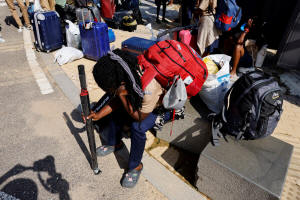How the World Scout Jamboree descended into chaos in South Korea
 Send a link to a friend
Send a link to a friend
 [August 09, 2023]
By Ju-min Park [August 09, 2023]
By Ju-min Park
SEOUL (Reuters) - Overflowing trash bins. Dirty toilets. Bug-infested
fields.
These were some of the conditions that about 40,000 teenage scouts had
to contend with in the past week at the World Scout Jamboree, sending
red-faced organizers in South Korea scrambling to fix matters before a
looming typhoon forced everyone to leave the ill-fated campsite.
The event, the first global gathering of scouts since the pandemic, was
attended by representatives from 155 countries and presented South
Korea, which has hosted both the summer and winter Olympics and the
soccer FIFA World Cup, with yet another opportunity to showcase its
ability to organize big events.
But planning documents and interviews with participants and government
officials show that even without the challenges posed by the weather -
the event was held in a heatwave - the jamboree was marred by unheeded
warnings and insufficient preparation.
As far back as 2017, when South Korea won the bid to host the jamboree,
the campsite on reclaimed mud flats was seen as potentially problematic,
according to a Reuters review of publicly available government reports.

One of the reports showed that officials from Saemangeum Development and
Investment Agency, a government organization that developed the campsite
area, had called for enough shade and toilets to be set up after
visiting the 2019 World Scout Jamboree in West Virginia to learn more
about the event.
"It is located in a field without trees so it is necessary to create
shade and shelters to avoid the heat for the safety of participants,"
the report said. There must also be enough toilets and odor control to
"not undermine national credibility", it added.

However, in reports published in 2018 and 2020, North Jeolla provincial
planners found that the original plans to plant "a rich forest" at the
campsite would be impossible because the land was too salty. A province
official said they had set up tunnels made of vines to help cool the
area but acknowledged those weren't enough.
Shortly after the scouts arrived last week amid unseasonably high
temperatures of up to 34 C (93 F), hundreds fell ill with heat-related
symptoms, bug bites and other ailments. Organizers then sent in more
medics, supplies and water trucks.
[to top of second column]
|

Participants who left the camping site
of the 25th World Scout Jamboree, arrive at a university in Incheon,
South Korea, August 8, 2023. REUTERS/Kim Soo-hyeon

Matt Hyde, UK Scouts' chief executive, told Reuters the group
decided to withdraw its contingent - the event's biggest - because
toilets weren't being cleaned, rubbish was building up, and scouts
weren't getting enough food.
"It wasn't safe in there," he said, calling for an independent
inquiry into the event's planning.
Unsanitary toilets were one of the biggest problems at the event,
gender equality minister Kim Hyun-sook, the co-head of the
organizing committee, said when asked about what went wrong.
The organizers say they boosted the number of cleaning staff from 70
to 540. Because of the camp's "poor condition", the province
mobilized 520 public servants to help clean showers and toilets, a
provincial official with direct knowledge of the matter said. The
official declined to be named as he was not authorized to speak to
the media.
'WHO WOULD HAVE THOUGHT?'
The public debacle, which played out in international media as
participants, parents, and senior scout officials lodged complaints,
comes at a sensitive time for South Korea's government, which has
gone all in for a bid to host the 2030 World Expo in the southern
city of Busan.
The host Expo country will be chosen in November, and some South
Koreans worry that the incident could tarnish their country's
reputation ahead of this selection process.
"South Korea has been known as a developed country so who would have
thought that this country can't fix issues like bugs or toilets?"
said Hong Ki Yong, a business professor at the University of Incheon.
An official at the Saemangeum development agency, declining to be
named due to the sensitivity of the issue, told Reuters that too
many people were involved in preparing for the event, which probably
led to "immature management" of key aspects such as sanitation and
delayed fixing problems.
"We feel bad about what happened, too," the official said.
(Reporting by Ju-min Park and Josh Smith; Writing by Josh Smith;
Editing by Miral Fahmy)
[© 2023 Thomson Reuters. All rights
reserved.]This material may not be published,
broadcast, rewritten or redistributed.
Thompson Reuters is solely responsible for this content. |